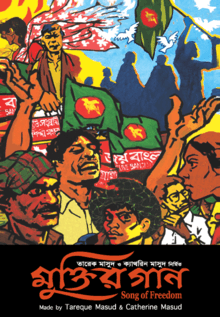Muktir Gaan
| Muktir Gaan | |
|---|---|
 Poster of Muktir Gaan | |
| Directed by |
Tareque Masud Catherine Masud |
| Produced by | Tareque Masud |
| Cinematography | Lear Levin |
| Edited by | Catherine Masud |
Production company |
Audiovision |
Release dates |
|
Running time | 78 minutes |
| Country | Bangladesh |
Muktir Gaan (Bengali: মুক্তির গান The Song of Freedom) is a 1995 Bangladeshi documentary film Directed by Tareque Masud and Catherine Masud.[1] This is a documentary film which explores the impact of cultural identity on the Bangladesh Liberation War in 1971, where music and song provided a source of inspiration to the freedom fighters and a spiritual bond for the whole emerging nation.[2]
Background
During the Liberation War in 1971, a cultural troupe, named Bangladesh Mukti Shangrami Shilpi Shangstha used to travel to refugee camps and different areas in Mukta Anchal, perform patriotic songs, arrange puppet shows and stage dramas to inspire the freedom fighters and people with the spirit of war.[3] Muktir Gaan, 25 years in the making. Tareque and Catherine used original footage by American film-maker Lear Levin, as well as other archival footage collected from the UK and India.[2]
Crew
- Tareque Masud, director, co-producer
- Catherine Masud, co-producer, editor
- Lear Levin, Cinematography
Synopsis
In 1971 the people of East Pakistan (now Bangladesh) waged a bitter war of liberation against West Pakistan, which ended in December in 1971 with the foundation of the country of Bangladesh. The film Muktir Gaan is a special and rear archive of footage of this war. Firstly the footage taken by American filmmaker Lear Levin shot of a group of young musicians and actors who at the time travelled through the country with battle songs and political puppet shows. The film follows the group not only during their performances for refugees and guerillas but also during their travels, which has produced many melancholy pictures. Levin's material is available for the first time thanks to two filmmakers from Bangladesh who, being discontent with the present regime, wanted to remind the Bengal people of the initial motives of the war of liberation: freedom and democracy. Despite opposition by the government, the film was screened in Bangladesh where it was a resounding success.[4]
Music
The songs in Muktir Gaan have been sung by various singer of the country. The film also features Brig Gen (retired) Giasuddin Chowdhury, Aminul Haque Badshah and other nameless freedom fighters who fought for liberation of the country.[3]
- Bipul Bhattacharjee
- Debobroto Chowdhury
- Dulal Chandrashil
- Laila Khan
- Lata Chowdhury
- Lubna Marium
- Mahmudur Rahman Benu
- Shaheen Samad
- Sharmin Murshid
- Swapan Chowdhury
- Tariq Ali
See also
References
- ↑ "Muktir Gaan". tarequemasud.org. Retrieved 2013-07-03.
- 1 2 "Muktir Gaan". ektaonline.org. Retrieved 2013-07-03.
- 1 2 "Tareque Masud and Muktir Gaan". news.priyo.com. Retrieved 2013-07-03.
- ↑ "Muktir Gaan". idfa.nl. Retrieved 2013-07-03.